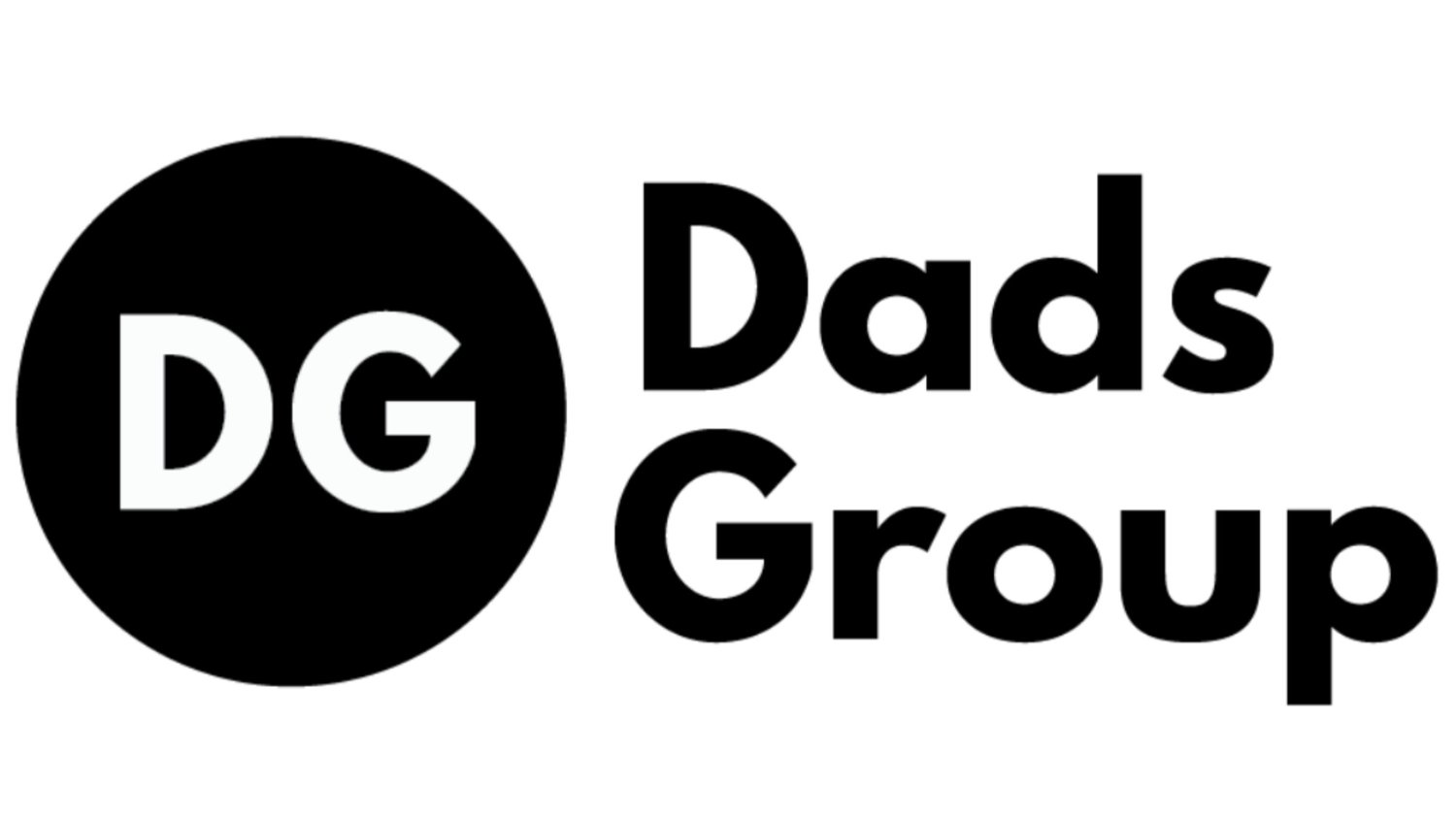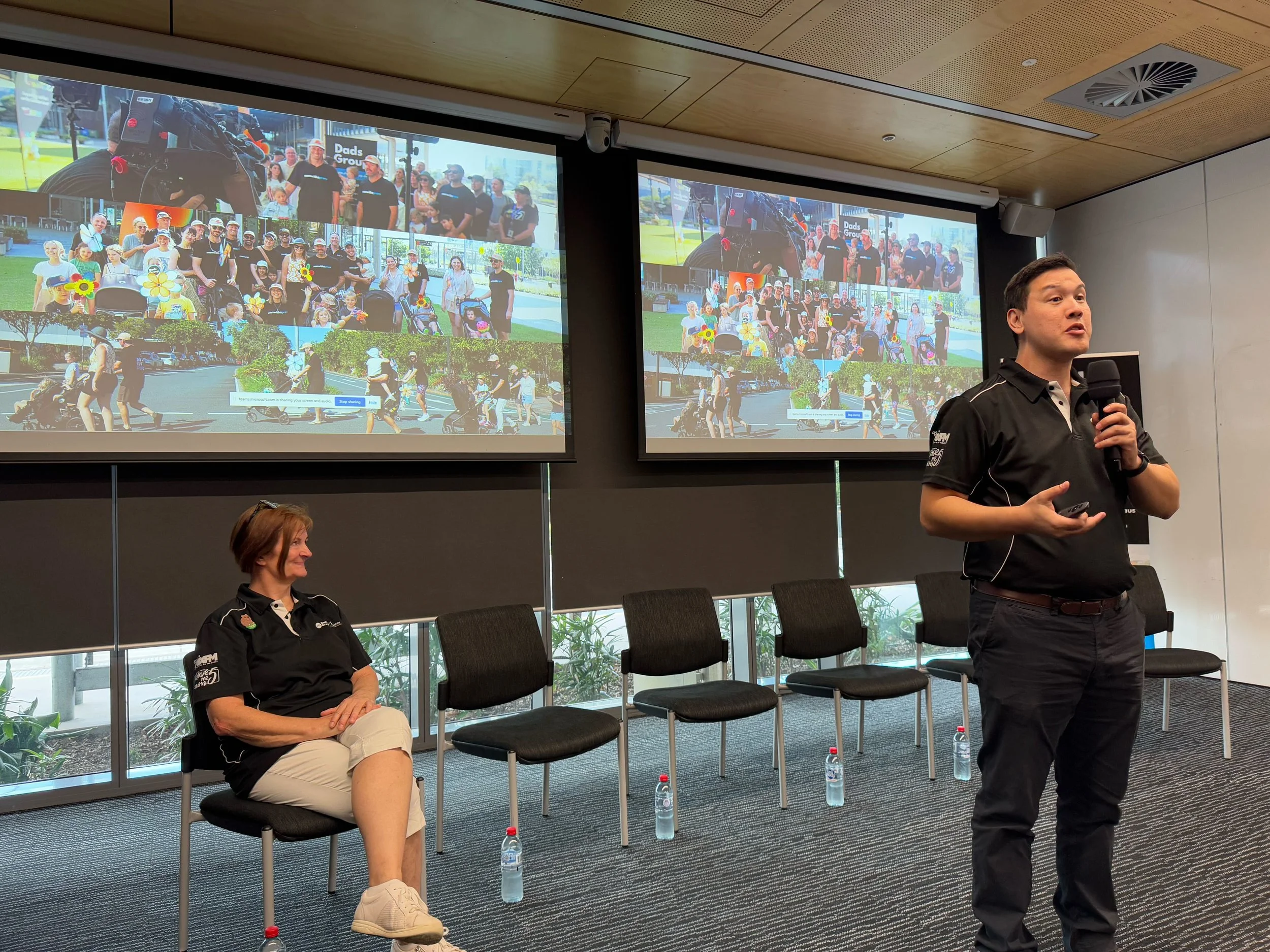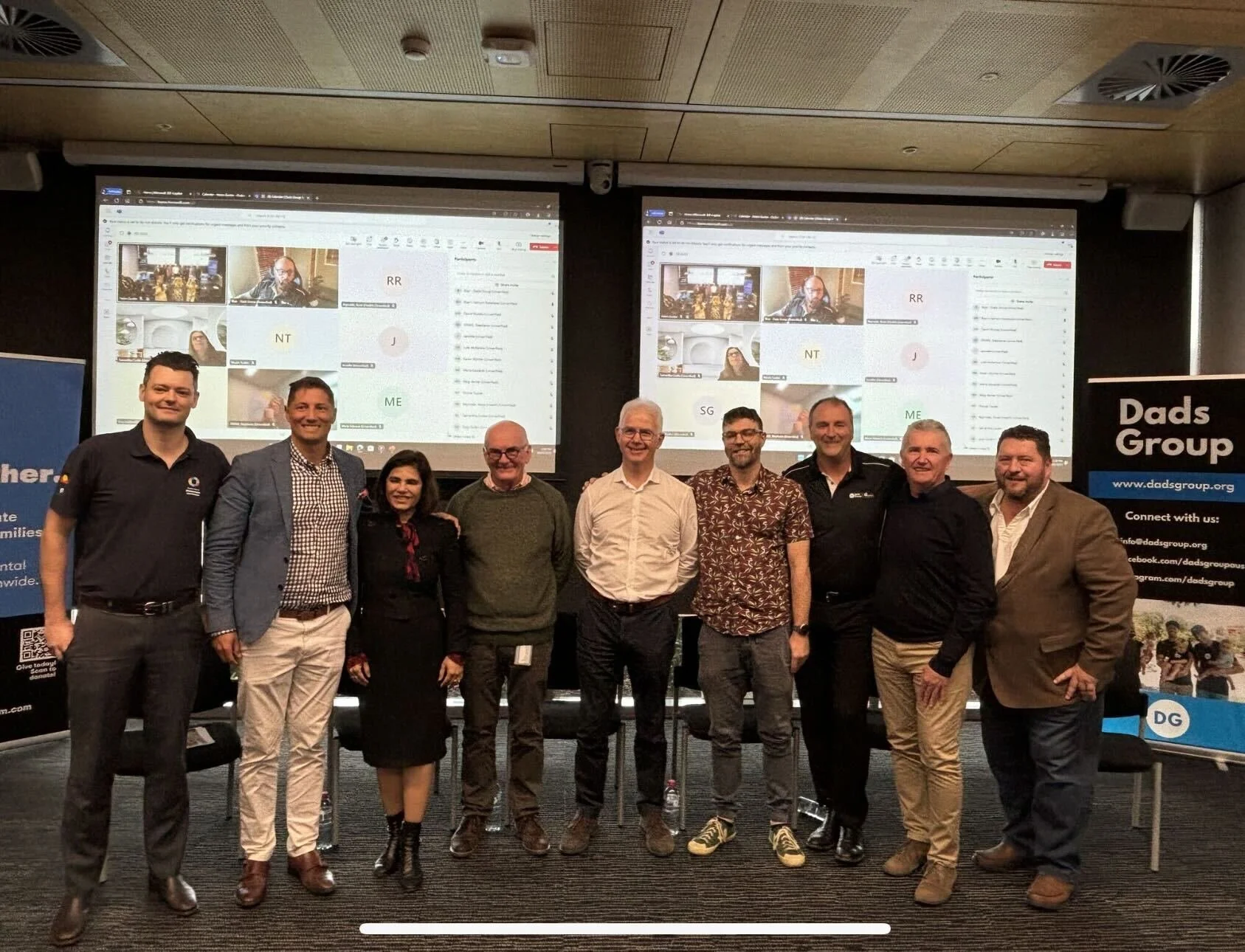Breaking New Ground: How Dads Group is Changing the Health System for Fathers
At Sunshine Coast University Hospital, a quiet but powerful shift is underway, one that could reshape how we care for families across Australia. The Dads Group Integrated Model of Care is actively rewriting the narrative for new and expectant fathers. For too long, dads have sat on the sidelines of perinatal care, present, but rarely engaged.
At the Sunshine Coast Showcase, that began to change. The event was more than a presentation, it was a clear demonstration that this kind of system reform is not only possible, but already working.
Why We’re Here: More Than a Program
The showcase gathered over 60 leaders, clinicians, researchers, policymakers, and frontline workers. It served two purposes:
To celebrate the progress made embedding fathers directly into health system care.
To explore the next steps for expanding this model across Queensland and the country.
As Dads Group Founder and CEO Thomas Docking explained:
“This is a ‘wicked problem’, no single organisation can solve it. We need whole systems working together to better support fathers, mothers, and children.”
From Curiosity to Commitment: Adam Burns (Dads Group IMC Program Lead)
Adam Burns, Program Lead for the Integrated Model of Care (IMC) at Dads Group, delivered a comprehensive overview of how the IMC works in practice—connecting research, implementation, and lived experience to transform hospital and community care for fathers.
He outlined how the IMC:
Embeds peer support programs in maternity hospitals,
Trains health staff to engage fathers early,
Builds bridges between hospital, community, and digital supports,
And delivers measurable outcomes in connection, mental health, and service access.
“Our goal is to move leaders from professional curiosity to personal investment.”
Adam shared early evaluation insights showing reduced social isolation, improved emotional wellbeing, and stronger family engagement, and emphasized that the model is scalable, evidence-aligned, and co-designed with frontline staff and dads.
His leadership has been central to ensuring the IMC is not just an idea, but a functioning framework that’s already improving lives—and shaping the health system from within.
Adam Burns (Dads Group IMC Program Lead)
Opening Doors to System Change: Keppel Schafer (Sunshine Coast Health)
Keppel Schafer, Nursing & Midwifery Service Director for Children’s Services at Sunshine Coast Health, delivered a powerful address highlighting how system leadership can drive long-term, sustainable change. As both a clinician and a father, Keppel reflected on his journey working with Dads Group and Wishlist to embed the Integrated Model of Care (IMC) into the health system—not as a one-off project, but as business-as-usual.
“I didn’t want to pour time, money, and energy into something that ends when the funding runs out. We needed to build something sustainable.”
Keppel acknowledged the value of lived experience in shaping better services, sharing how difficult it was to build social connection when he first became a dad on the Coast. His leadership has been instrumental in making father-inclusive care part of core hospital culture, through partnerships, cross-departmental collaboration, and practical alignment with staffing and service structures.
He closed by encouraging everyone to be "system motivators and encouragers," reminding us that true generational change takes time—and commitment beyond election cycles.
Spotlight on Systems Leadership : Michael Hogan
Michael Hogan, Executive Convenor of the Thriving Queensland Kids Partnership (TQKP), delivered a compelling address at the recent IMC Showcase. With decades of public service leadership, Michael emphasized the power of collaborative, evidence-based systems change to improve outcomes for children and families across Queensland.
Key Highlights:
1. Collaborative Systems Change
Michael highlighted the importance of connecting existing programs rather than creating new silos:
“We start from the idea that we do better together – that we can take programs and people who are making in-roads, and connect them, learn from them, and boost them.”
2. Focus on Prevention and Early Intervention
Drawing on the foundational role of early experiences, Michael reminded us:
“What surrounds us shapes us.”
This ethos drives TQKP’s commitment to addressing adversity and building resilience from the earliest years.
3. Brain Builders Initiative
He introduced the Brain Builders initiative—an exciting effort to integrate neuroscience into education, supporting healthy brain development in children through practical, research-informed strategies.
4. Place-Based Solutions
Michael reinforced the value of how the IMC is tailored to suit local needs, especially in rural and remote communities.
His insights further validated the Dads Group IMC approach as aligned with broader efforts to embed system-wide, inclusive support for families.
Clarifying any Misconceptions about working with fathers: Karen Wynter
Dr. Karen Wynter made a particularly insightful comment at the IMC Showcase, highlighting the misconception that including fathers in perinatal care would detract from maternal care. Her words challenged the outdated, zero-sum mindset and reframed inclusion as an enhancement to family support, not a compromise:
“At the beginning, people assumed that if we asked for fathers to be included, it meant mothers would be negated. But that’s not the case. Including dads actually strengthens the whole family care system.”
Her remark reinforced the importance of integrated care and was directly echoed and appreciated by Simon von Saldern during his keynote, underscoring its systemic significance. Let me know if you'd like this quote prepared for a slide, report, or media brief.
We Don’t Only Address the Fathers, We Address the System: Simon Von Saldern
Simon von Saldern, CEO of Healthy Male, said: "We Don’t Only Address the Fathers, We Address the System". The real innovation of the Integrated Model of Care lies in its systems approach.“The Dads Group model addresses each of the seven Plus Paternal goals. That is no small thing.”
This model isn’t just another service for men, it’s a fundamental shift in how maternity, child health, and community services operate. Rather than adding extra burdens to already stretched health services, the model embeds father-inclusive care directly into existing pathways.
“We don’t only address the fathers, we address the system.”
It meets fathers early, often during childbirth education, and stays connected long after discharge, creating stronger families and better long-term outcomes.
“Dads Group has shown in no uncertain terms that this model works.”
Real Fathers. Real Stories. Real Impact.
Throughout the day, lived experience was front and centre.
Andrew Boniface, one of the Dads Group mentors, shared:
"I deeply wish I had this support years ago. It could have changed my marriage, my family, my own mental health."
Jordan Cotter from the Queensland Mental Health Commission reflected on his own early fatherhood experience, describing the emotional challenges when dads feel unprepared or invisible in medical settings.
Child Health Nurse Helen Gunter spoke to what she has witnessed for decades:
"Birth trauma often affects the dads even more than the mums. In those early weeks, dads can feel invisible and overwhelmed."
The Numbers Are Clear
Since the Sunshine Coast pilot launched:
Over 180 fathers have engaged directly with the program.
The vast majority report feeling seen, acknowledged, and better prepared.
Many requested longer, more frequent sessions. A strong sign of both interest and need.
Fathers are now being referred into mental health support, peer networks, and additional community services.
As the mentors reported, even a single safe conversation is enough to open doors many dads didn’t know existed.
Bigger Than Health: A Whole-of-Community Impact
Brendan Hogan from Wishlist, Sunshine Coast’s Hospital Foundation, captured the broader opportunity:
“We’re in the impact business. Let’s lift our sight up and think larger and bigger.”
This isn’t just health reform, it’s about building local villages of support for mums, dads, and babies. It addresses multiple national priorities:
Suicide prevention
Domestic violence prevention
Perinatal mental health
Early childhood development
Family wellbeing
As Federal MP Ted O’Brien put it:
“Men’s health matters and it matters for more than just men.”
A Rare Cross-Sector Partnership
One of the showcase’s unique strengths was the powerful collaboration on display, bringing together:
Clinical leaders and maternity services
Child health nurses and midwives
Mental health commissions
Policy makers and government representatives
Leading researchers and data experts
Philanthropic foundations
Fathers with lived experience
As Thomas Docking reflected:
“We now have a way forward for scaling the Integrated Model of Care across the state and country.”
Reflections from the Field: Ted Weaver
Ted Weaver, respected obstetrician and health advocate, shared a reflective and personal endorsement of the Dads Group IMC initiative. Drawing on decades of clinical experience, he spoke to the transformational power of inviting fathers into the perinatal journey, not as bystanders but as active participants in family health.
His words reinforced the message that system change is possible when clinicians, communities, and policy-makers work together, and that the IMC is a powerful step in that direction.
“It’s a privilege to be part of something that’s shifting how we think about families—from the inside out.”
Research Insight: Dr. Barnaby Dixson on Supporting Fathers
Dr. Barnaby Dixson from the University of the Sunshine Coast shared compelling research from the Queensland Family Cohort study, highlighting that low social support is the strongest predictor of depression, stress, and anxiety in expectant fathers. He advocated for routine screening of dads during the perinatal period, noting it benefits not only fathers’ mental health, but also improves maternal wellbeing and child outcomes. His research reinforces the case for embedding father-inclusive practices into standard perinatal care.
On-the-Ground Wisdom: Dan Smith (The Smith Family)
Dan Smith, Program Manager at The Smith Family in Central Queensland, brought a grounded, practical voice to the panel—blending personal experience as a father of three with decades of work in health and community services. Drawing from his role in the Communities for Children initiative, Dan shared the challenges and learnings from trying to engage fathers in a system not originally built for them.
He acknowledged the limitations of program funding structures but emphasized the importance of flexible, collaborative approaches, noting that:
“There’s no gospel of how to work with dads—it’s a slightly different story in every place.”
Dan praised the Dads Group model while highlighting how local adaptations are essential—like shifting programs to align with FIFO rosters in Rockhampton. He pointed to the value of building referral pathways and partnerships with other local services already engaging dads.
Finally, Dan referenced a recent presentation he and Tom delivered at the Family Relationship Services Australia (FRSA) conference and suggested the co-authored Connecting Dads of Capricorn: A Story of Place-Based Practices paper as a valuable resource capturing real-world insights into engaging fathers effectively.
Clinical Perspective: Dr. Alka Kothari on Shifting Hospital Culture
Dr. Alka Kothari, senior obstetrician and perinatal researcher at Redcliffe Hospital, offered a powerful reflection on the cultural shifts required in hospital settings to meaningfully engage fathers. She shared her journey of challenging long-standing assumptions in maternity care—like the belief that dads are “just visitors”—and highlighted how inclusive language, visible signage, and staff education can help fathers feel they belong in the birthing and parenting journey.
Dr. Kothari praised the partnership with Dads Group as a model for “activating system change from within,” and noted how co-designing hospital-based father engagement practices with midwives, mental health clinicians, and dads themselves has led to more connected and supported families.
“If we want fathers to show up for their children, they need to feel invited—right from the hospital door.”
Her remarks underscored the critical role health professionals play in making inclusion real, not just theoretical.
National Alignment: Rob Mills (Tresillian)
Rob Mills, representing Tresillian Family Care Centres, spoke in support of the collaborative effort behind the IMC and the value of embedding father-inclusive practice within early parenting services. He reaffirmed Tresillian’s shared commitment to co-developing sustainable and scalable models that align with national priorities for early intervention and mental health.
Rob acknowledged the importance of showcasing partnership work—like the IMC—and noted that the May 29 event offered a unique platform to demonstrate shared goals and system alignment between Tresillian and Dads Group.
Political Support: Ted O’Brien MP
Ted O’Brien, Federal Member for Fairfax, delivered a strong message of parliamentary support for community-driven health reform. He praised the IMC Showcase for presenting a solution to one of the nation’s pressing issues—engaging fathers in early parenting support—and highlighted that the program offers a clear and constructive pathway for improving outcomes in family wellbeing, mental health, and early development.
“This is one of those great Australian initiatives that starts in a local community and has the potential to shape national systems.”
His remarks helped position the Dads Group model as both timely and scalable, reinforcing its relevance across health and policy sectors.
A National Model Ready to Scale
The Dads Group Integrated Model of Care already aligns directly with:
The National Men’s Health Strategy
National Perinatal Mental Health reforms
Queensland’s Trauma Strategy
The Australian Alliance for Perinatal Mental Health
The Plus Paternal Research framework
As Simon von Saldern concluded:
“If you’re wondering whether to move forward with this, yes, you should. If you can be the first state to adopt this model fully, fathers for years to come will thank you for it.”
Conclusion: A Generation Better Equipped
The Sunshine Coast Showcase wasn’t simply an event, it was a blueprint for real system change. A clear path forward now exists to embed father-inclusive care into health systems across Australia.
“Here’s to a generation of mums and dads better equipped to meet the needs of their partners, their infants, and themselves.”
— Thomas Docking







